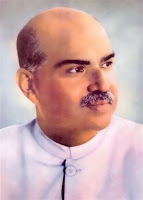Whether attending Bhumi Pujan by PM India is prohibited by Constitutional Oath?
 Whether attending Bhumi Pujan in official capacity by PM India is prohibited by constitutional oath. Because Secularism is part of the Basic Structure of Constitution. This is being debated today.It is imperative to know the truth behind this term "secularism" in India .Meaning and interpretation was debated in the Assembly on several occasions. It is relevant to mention the debate dated 27 December 1948 of Constituent Assembly for the amendment no 1146 standing in the name of H .V. Kamath. Debates on the Amendment no 1146 clearly, explicitly and precisely underlines in the meaning of secularism in the India.
Whether attending Bhumi Pujan in official capacity by PM India is prohibited by constitutional oath. Because Secularism is part of the Basic Structure of Constitution. This is being debated today.It is imperative to know the truth behind this term "secularism" in India .Meaning and interpretation was debated in the Assembly on several occasions. It is relevant to mention the debate dated 27 December 1948 of Constituent Assembly for the amendment no 1146 standing in the name of H .V. Kamath. Debates on the Amendment no 1146 clearly, explicitly and precisely underlines in the meaning of secularism in the India.Amendment No. 1146, as moved and duly adopted , was as follows:-
"That in the affirmation or oath in article 49, for the words 'I, A. B. do solemnly affirm (or swear)', the following be substituted:-
'In the name of God, I, A. B, do swear'
or alternatively,
'I, A. B. do solemnly affirm'."
...The more, Sir, we avoid God, the more we try to flee from Him, the more He pursues us.There is a beautiful poem,"The Hound of Heaven" by Francis Thompson, which describes the state of mind of one who tried to flee from God."I fled Him down the nights
And down the days,
I fled Him down the arches of the years, etc."
and so he goes on: then he says:
"But with unhurrying chase, unperturbed pace
The feet of God pursued him,
"And a voice beat more instant than the feet,
All things betray thee
Who betrayest me."...
...The Governor-General, Sir, on Thanks-giving Day after the Hyderabad operations, in his speech, stated:
"Ministers, Generals, Soldiers, Police and Citizens, all are entitled to our gratitude. But nothing moves in this world but God moves it. We imagine we have done great things."...
...Our President, Dr. Rajendra Prasad, last year when he broadcast a message on Independence Day, said:
"With the help of God and under the leadership of Gandhiji we have won the battle of freedom and gained our objective."...
...Netaji Subhas Chandra Bose in Singapore, when he became the Commander-in-Chief and Provincial President of the Arzee Hukumat-e-Azad Hind, took the oath which ran thus:
"Ishwar ke nam par main pratigy karta hun."...
Sardar Patel recently in Bombay declared:
"We are grateful to God that we have succeeded in stablishing stabilized conditions in our country to a certain extent."
Therefore, Sir, in the end, I would appeal to the House that we are heirs to an immortal and a spiritual heritage, a heritage which is not physical, nor material nor temporal: a heritage which is of the spirit--a spirit that is, ever was, and ever shall be, a heritage that is eternal. Let us not squander this invaluable heritage. Let us not dissipate this heritage: let us remain true to our ancient heritage, our spiritual genius. Let us not lightly cast away the torch that has been handed down to us from time immemorial. Let us in the words of Swami Vivekananda aspire to conquer the world spiritually. Let us blaze forth a trail that will be the light of the world as long as the sun and moon and stars endure. I shall only end with the words which were ever on Mahatma Gandhi's lips:
"Ishwar Allah tere nam
Sabko sanmati de Bhagvan."
...Some vain kind of politicians in their attempt to imitate some fashionable slogans of the West have allowed themselves to believe that in a secular State God is taboo. A secular State means the state of Truth and God and eternity without prejudice to any particular religion. In India all our culture, and all our policy and civilization has been spun and woven round the one nucleus, God, and if God is banished I do not know what Swaraj will mean to India. Personally I along with so many others, seniors and juniors, and millions of people fought for thirty years for Swaraj. The Swaraj of my conception was Ram Raj. It was not the political freedom alone that mattered. If I may be permitted to say so, I care a tuppence for political freedom. India did not only mourn the loss of her political freedom but her real grief has been the loss of her freedom of spirit. Our spiritual freedom was first hit when Somnath was attacked.Since that time, all these hundreds of years, India has not been feeling free. Real Swaraj means "Ram Raj" How this idea of secularity has been misinterpreted, I will not be going out of the subject if I take the house into confidence and inform them that very recently at a conference of A. I. R. officials they came to the unanimous decision that the recitation of the Gita and the Ramayana, the Koran and the Bible should now be stopped. If secular State means that our children will not know about the Ramayana or listen to the Gita or the Koran or the Granth what is political freedom worth? This is stretching the meaning too far. If God is banished from this "Ram Rajya", India will become Ayodhya without Ram....
"...Even in the British Parliament, when they assemble, they do so only after prayers. They hold prayers. In the proceedings you will find that the Parliament met at such and such an hour and after 'prayer' began their proceedings. Theirs is not a communal State too. In Ireland, as also in many other places, God is not forgotten.... We worship God and our faith must be recorded. India believes in God and therefore the Indian State must remain a State of God. It must be a godly State and not a godless State. This is our meaning of secularity..."
Interestingly यतो धर्मस्ततो जयः॥ (IAST: Yato Dharmastato Jayaḥ)
Where there is righteousness (dharma), there is victory (jayah) is the motto of the Supreme Court of India.Source of this motto is the Mahabharat. Romans used usebeia term for understanding the concept of Dharma during the reign of Ashoka 2500 years ago. Usebeia restricts the understanding of the concept of Dharma to moral values . Unfortunately the 19 century used word religion for understanding the concept of Dharma. Both Usebeia and religion have failed to to justice with the concept of Dharma .
Where there is righteousness (dharma), there is victory (jayah) is the motto of the Supreme Court of India.Source of this motto is the Mahabharat. Romans used usebeia term for understanding the concept of Dharma during the reign of Ashoka 2500 years ago. Usebeia restricts the understanding of the concept of Dharma to moral values . Unfortunately the 19 century used word religion for understanding the concept of Dharma. Both Usebeia and religion have failed to to justice with the concept of Dharma .
Sri Aurobindo writes on the concept and integral view of Dharma. (CWSA Volume 20)Sri Aurobindo asserts that" the Dharma, at once religious law of action and deepest law of our nature, is not, as in the Western idea, a creed, cult or ideal inspiring an ethical and social rule; it is the right law of functioning of our life in all its parts. The tendency of man to seek after a just and perfect law of his living finds its truth and its justification in the Dharma. Every thing indeed has its dharma, its law of life imposed on it by its nature; but for man the dharma is the conscious imposition of a rule of ideal living on all his members."
Therefore, secular state is neither a God-less State nor an irreligious nor an anti-religious State but Dharmic State. This is the secularism in India which forms the basic structure Doctrine of the Constitution.
That Dharma not the ruler has been the sovereign in the land of Vedas. This was asserted by Dr Radha Krishnan in reply to Objective Resolution of Pt Neehru. He said on the concept of Dharma on 20 Jan1947, in Constituent Assembly Debates "When a few merchants from the north went down to the south, one of the Princes of the Deccan asked the question. "Who is your King?" The answer was, "Some of us are governed by assemblies, some of us by kings."
Kecid deso ganadhina kecid rajadhina.
Panini, Megasthenes and Kautilya refer to the Republics of Ancient India.The Great Buddha belonged to the Republic of Kapilavastu. Much has been said about the sovereignty of the people. We have held that the ultimate sovereignty rests with the moral law, with the conscience of humanity. People as well as kings are subordinate to that. Dharma, righteousness, is the king of kings.
Dharmam Kshatrasya Kshatram.
It is the ruler of both the people and the rulers themselves. It is the sovereignty of the law which we have asserted."
Surya Pratap Singh Rajawat
Advocate



💐💐💐💐💐💐💐
ReplyDeleteआप को इस लेख के साथ भगवान राम का वह चित्र भी लगाना चाहिए था जो संविधान की मूल प्रति में लगा हुआ था।
ReplyDeleteआप को इस लेख के साथ भगवान राम का वह चित्र भी लगाना चाहिए था जो संविधान की मूल प्रति में लगा हुआ था।
ReplyDelete